Cecilia Corrigan’s TRUE BEIGE reviewed by Leslie Allison
Don’t call me ‘you,’ me!, Cecilia Corrigan commands herself in a startling line from her recent chapbook True Beige (Trafficker Press, 2013). I read this line and totally flipped out. Throughout her voracious and hilariously self-defeating piece, Corrigan weaves similar, self-reflexive threads that jolted me out of my basic assumptions about everyone’s roles in this unspoken contract: the poet writes a poem, bows out, and then the reader reads it. Not in Corrigan’s world. Here, the poet sticks around. Her active gaze follows you everywhere; it makes a subject of you, of the poem, of itself (Cecilia?), of the narrator (separate from Cecilia?), and of other characters, swiftly and freakily, like a demon possessing different hosts.
The poet’s thoughts about the unfolding poem appear often: These Sentences are getting more complicated in this poem, now; The ‘you’ is shifting in the poem; So many abrupt changes in this poem! By reminding the reader of everything that is happening as it is happening, Corrigan creates a real-time temporality that slaps your imagination on the wrist just when you were about to suspend disbelief. Spooky, twisted, and strong, each of these observations seems to be Corrigan’s cannibal who eats her own body.
The narrator of True Beige has a brassy voice, eager to leap off the page and into a throat.The read-in-my-head text simulates a read-out-loud text, aperformance. There’re only two possible outfits I could wear which could be appropriate for the performance of this poem brings me right there, in the audience, watching the poet in her outfit, gesticulating. When I read, Oh look can I get a volunteer to call me ‘the enemy of all things good and holy?’ I’m like “Ooh! pick me!” Because I do want to call her that.
The narrator further transforms the reader into a listener with these deliberately audible emphases: liiiike, It is so uhhhh?,MATH <clap> MATH! <clap> MATH! <clap>.But the listener in this audience doesn’t stay distanced from the performer. Corrigan is quick to wink at you, show you backstage, even take you home with her. You get to be in her room late at night, creeping over her shoulder, watching her lean on the w key: I think it was the American Poetry Reviewwwwwwwwwwwwww. There are other, less intentional, spelling and grammatical errors that show up across the poem like little cuts and scrapes. Did someone copy edit this? The effect is either revealing of some kind of rough honesty, or just a product of an editorial process that was, as the poet puts it, a real horror.
Settings and narratives in True Beige arise and drift off. Cecilia is in front of a classroom, she gchats with Trisha Low, READ MORE >
November 26th, 2013 / 6:05 pm
If Not Notley Then Whatley Elseley?
 I’m Cassandra Gillig and I can’t believe that it’s Not Illegal to buy this new chapbook by Alice Notley. It’s not even imprudent or tacky, it’s just a good thing that is good. I did it two times and am waiting for the results !!!The Results Are In!!! just kidding they’re not I only ordered it seven minutes ago.
I’m Cassandra Gillig and I can’t believe that it’s Not Illegal to buy this new chapbook by Alice Notley. It’s not even imprudent or tacky, it’s just a good thing that is good. I did it two times and am waiting for the results !!!The Results Are In!!! just kidding they’re not I only ordered it seven minutes ago.
No one has gone to the bother of describing the book I have no idea how many pages it is this could be not even a book IS THIS ACTUALLY A BOOK WHAT THE FUCK DID I JUST BUY I AM CALLING THE POLICE if Not A Book then What is It I think probably It is Good do you need more than that? You do? OK it is this big: 5 1/4″ x 7″. I don’t remember if quotes mean inches or feet. Is this a SEVEN FOOT TALL BOOK? This is just how it has to be when you need it to happen. I still don’t know if this is a book or not.
Back in the late seventies or early eighties (what) Robert Creeley said of Alice Notley, “She’s the Boss.” There was even another Boss at that time: Bruce Springsteen. Alice was just that good; she was better than thunder road or hungry heart–much better. I can’t believe I know people who have decided to not buy this chapbook I think it’s just rude. You’re sitting and not buying how should I feel about it if not personally offended. I am a little sour you have not bought it why are you still reading this and not having this page open to order and buy this chapbook. This chapbook was made by The Catenary Press which seems like a reliable source of chapbooks. It seems like–generally–people give them money and then they give those people chapbooks. It’s so crazy this fucked up capitalist economy where you can buy things or even buy works of art. What the fuck I miss the good old days when carriage rides were all that moved me.
I can’t review it because I haven’t read it but I can tell you that without Alice Notley’s work I would be probably engaged to be married to The Wrong Guy. God what would I have done with The Wrong Guy? Would we have even been able to Go Out? There’s a Wrong Guy on almost every corner of every street in every America. I bet none of them would buy this chapbook. Oh god what did I almost do??? I am a marked woman through and through.
Andrew Durbin: Ari Spool for Mayor of New York
If you’re like me and you don’t vote, you probably don’t do it out of dissatisfaction with our current democratic process (though there’s that, duh), you probably do it because you’re lazy, a fact a little at odds with your interest in radical politics. Those lines, those leavers… all those opportunities for fraud (outside the fraud of the entire financial system that makes it possible in the first place), I just can’t. I don’t think not voting is radical; I think it’s a simple disapproval of the way things are done and, really, a real distaste for a line that doesn’t end in free pizza. I’m the ambivalent non-voter. I’d like to see Big Change, but not Barack Obama’s brand (more like the, um, Communist–or Commonist–brand). I’m voting for Ari Spool because I’m a Commonist, really, and I think Ari is too, because common to us all is a kind of ambivalence that really sets her apart from the rest of the field, a plucky, aggressive little group that includes Bill de Blasio whom, of course, I kind of like. I like his wife more, but she’s not running for mayor. Lhota, de Blasio: they just want to win too much. It’s a bad look, face it. They want to live in a mansion and get cozy with all the people that make the rest of us lose our lunch. I’m voting for Ari because I don’t think Ari cares about Business, Big or otherwise, I think Ari cares about art. I’m voting for Ari Spool because I want more art and you should too. Art in the streets, art in your apartment. Art should replace money. Art should be everywhere, right? I also think Ari’s election night party, whether she wins or loses, will be better than de Blasio or Lhota’s combined. See you there?
Felix Bernstein’s Response to Vanessa Place, Slavoj Žižek, Trisha Low, and more
Beyond Vampires and Zombies
An Essay by Felix Bernstein
Vanessa Place’s latest manifesto “Zombie Poetry”[1] accurately frames her modus operandi: to glorify (and sanitize) Freud’s death drive (in which, doomed to never get what you want, satisfactory pleasure becomes impossible), over and against eros (the principle of maximizing pleasure). She provides a didactic demonstration of the death drive by casting herself in the role of Thanatos, a self-proclaimed undead zombie, feeding off (appropriating) the naïve pleasure of those feebleminded creatures who attempt to maximize pleasure, lecturing us that our notion of satisfaction and of mastery is a lie. Place is largely influenced by the famous schtick of Lacanian philosopher Slavoj Zizek, who is a master of belittling the part of us that believes we will find fulfilling objects. His refrain, like the song, is you can’t get what you want but you can get what you need, with this kicker: what you need is an unpleasant excess in the object of your desire that serves as a reminder/remainder of that which is denied in sexual relationships. This unpleasant excess, so-named “the kernel of the real,” can be found as the remainder of fantasies and mathematical equations To extract this rem(a)inder, you must read between the lines of speech, strictly under the Lacanian rubric. Then you will always find this same truth: the split subject, barred from accessing its full desire; in other words, the truth is the failure of desire. And this truth will always be delivered, for it is universally applicable.
For Place, those ‘poets’ who have not taken the conceptual turn that she prescribes, are in the thrall of a silly fantasy that our words might matter before they are decoded, analyzed, or appropriated by a master-analyst. [2]. This is her charge against those poets who have not sufficiently removed themselves from the craft of voicing desire. But also, more troubling, the voices that Place appropriates (the dumb college jokes, the early feminist dogmas, the victim’s testimony) all are framed as being (in their original utterances) naively unaware of the critical discourse into which she is happy to drag them. Those who take on the ‘voices of others,’ be they infused by the traditions of Language or Flarf or New York School poetics [or romanticism or camp or punk] will for Place indulge in an ideological fantasy that does not properly recognize or critique itself. But we all indulge a bit now and then, don’t we? And so it is only human (in the ‘living breathing’ sense) that now, in “Zombie Poetry” when the prospect of Place herself losing relevance enters the scene, that she can finally ask us to be concerned about the personal, the tragic, and the autobiographical, at the expense of the comic and universal. Now, she begs, we ought to look at her particular case, her particular deadpan style, her “I’m melting” bathos, and feel for her! That is, we ought to feel for the woman who is unfeeling.
Indeed, those who do feel for Place now, those who do still recognize her as a mother to their art, but refuse to follow her dogmatically, even those followers, she ridicules for being stupid enough to ‘pay her’ to fulfill this role. By her own calculations, it is inconsequential whether or not one ‘likes’ Vanessa Place, for ‘liking’ is merely a dumb, naïve, response, suitable for social media. It only matters whether or not one is driven to her. And she will, indeed, find that many will be driven her way. And driven by a death drive that is, unlike the one late Freud describes, vaguely pleasant. That is because it is nothing other than a performance of death drive, in the skilled manner of Place or Zizek, it is intelligible, hip, ironic, and stripped of any great dangers. It is in fact more optimistic, gung-ho, communal, and ego-affirming than those arts that indulge openly in true eros. It does not threaten civilization or even make us better understand its discontents. Rather, such performance of thanatos smoothly valorizes what might otherwise have been disruptive, if it were rendered with aesthetic brilliance instead of uncompromising didactic un-deadness.
The vampiric persona has long been iconic of positive, sympathetic, communal identification with the death drive. This identification goes beyond “Garbo is the best” because it is also ” “Garbo’s coldness is our coldness.” Even when nakedly announced in Freudian terms, the death drive is often used as communally binding tool; for example, Lee Edelman’s No Future: Queer Theory and the Death Drive, a revered book in the literary academy (not to mention in the cults around Freud, Zizek, and Lacan). The art world and the pop world, epitomized by Warhol or Lady Gaga, respectively, has found numerous ways to cash in on such glamorous thanatos; but too often the result is art that has zero stakes in its self-conscious display of determinately empty signifiers. Such vampiric signifying feeds on the flesh of signifiers, styles, and dialects that remains alive for those “others” from whom they are appropriated. The vampire thrives via the necrotizing of living symbols for the purpose of galvanizing cash and social mobility. This is why Claire Bishop can praise ‘dark, critical, negativity’ in art (and find Conceptual Poetry to be perfectly negative), all the while, attempting unabashedly to usher these ‘negative’ new forms of art in to the halls of high commodities, with her critical stamp of approval writ large. Of course, such ‘negativity,’ as Zizek or Place or Gaga or Warhol offers, is only as ‘negative’ as it is completely intelligible to art audiences, and it will be forever intelligible because it has no ambivalence about using the signifier, ruthlessly, to prove its point (which is, after all, nothing more than to show that the empty signifier trumps what is conservatively viewed to be an authentic display of desire). But maybe the simplest example to look to, for now, is Twilight, where young Bella, ambivalent about how to register affect, ends up choosing the learned, urbane, death drive of the vampires over and against the dumb, rural, pleasure principle of the werewolves. Which one would you pick? It must be hard being a young post-feminist!
Happy New York (Part II)
Whether you are in NY or not, tomorrow is the last chance to see Herbert Pfostl‘s ALL SORTS OF REMEDIES. (Sad NY update: I was too late–for too long–with this post. More on Pfostl in the future. One week left to see Jerk.)
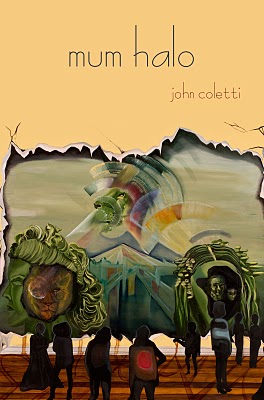
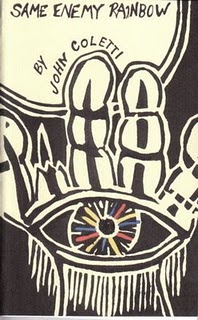 Justin’s book-buying success story made me happy for so many reasons that only some will surface in this roundabout (not to say failure) fable. Here’s to making Book-Buying: A _____ Story, a regular column. Until that category’s been added, I’ll continue with two of the many poets from my last post (on the Poetry Project New Year’s Reading, featuring a cast so deep I could draw on it all year and not touch bottom): namely, John Coletti and Arlo Quint.
Justin’s book-buying success story made me happy for so many reasons that only some will surface in this roundabout (not to say failure) fable. Here’s to making Book-Buying: A _____ Story, a regular column. Until that category’s been added, I’ll continue with two of the many poets from my last post (on the Poetry Project New Year’s Reading, featuring a cast so deep I could draw on it all year and not touch bottom): namely, John Coletti and Arlo Quint.
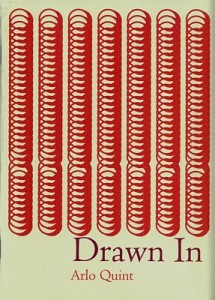 I’ve only read one of Coletti’s three(?) chapbooks and haven’t read a word by Quint, but I’m as excited about the former’s new book as CAConrad is (“Few things make me as happy as a new John Coletti book!” via Rust Buckle’s facebook page) and about the latter’s new chapbook(s?) as I am by just having discovered that CAConrad was born on January 1. It’s final: Poet of the Year. I say this, aware of all the reasons not to say such a thing, let alone in caps, partly in homage to New Directions’ Poet of the Month (1941-1943; the envelope pictured came with the 1942 boxed set I found at Grey Matter Books), READ MORE >
I’ve only read one of Coletti’s three(?) chapbooks and haven’t read a word by Quint, but I’m as excited about the former’s new book as CAConrad is (“Few things make me as happy as a new John Coletti book!” via Rust Buckle’s facebook page) and about the latter’s new chapbook(s?) as I am by just having discovered that CAConrad was born on January 1. It’s final: Poet of the Year. I say this, aware of all the reasons not to say such a thing, let alone in caps, partly in homage to New Directions’ Poet of the Month (1941-1943; the envelope pictured came with the 1942 boxed set I found at Grey Matter Books), READ MORE >
Happy New York (Part I)
 I don’t think the Rust Buckle Books (more on these in Part II) bee
I don’t think the Rust Buckle Books (more on these in Part II) bee r can logo (below) is by Brian Calvin, but seeing it reminded me–via Flood Editions, where Calvin’s heads (Half-Mast, 2001, and Killer, 2006) can be found on Graham Foust’s Necessary Stranger (2007) and A Mouth in California–that “Head”, his show at Anton Kern, closes on January 16.
r can logo (below) is by Brian Calvin, but seeing it reminded me–via Flood Editions, where Calvin’s heads (Half-Mast, 2001, and Killer, 2006) can be found on Graham Foust’s Necessary Stranger (2007) and A Mouth in California–that “Head”, his show at Anton Kern, closes on January 16.
I’m sure New Yorkers themselves go elsewhere (where?), but “Goings On About Town” is still my first stop to find out what I get for living where else. Although there’s always an abundance in ART (the above BRIAN CALVIN, WALLACE BERMAN – Jan. 9; “FROTTAGE” – Jan. 17) and MOVIES (Tati–tonight, Trafic–at the MOMA: see also, under ART, OROZCO) that I wish I wasn’t missing, rarely does READINGS AND TALKS make me want to move.
Ever abbreviated (possibly defensible in print, but why all the white space online, where this week there were three total readings–no talks–compared to eight pages of movies?), the section is never more so than in its annual capsule announcement of the reading of the year:
A hundred and forty poets and performers, including Penny Arcade, Yoshiko Chuma, Steve Earle, John Giorno, Taylor Mead, Judith Malina, Jonas Mekas, Eileen Myles, and Genesis Breyer P-Orridge, gather for the thirty-sixth annual marathon reading at the Poetry Project.
What about the other 130 plus poets (from Ana Bozicevic to Magdalena Zurawski) and performers (Philip Glass) and performers (Ostashevsky)? Is there another reading anywhere that, thanks to the Project’s own Arlo Quint (and Emily XYZ) covers every letter? But I guess I shouldn’t quarrel with an alphabet that begins with Penny Arcade and ends with Genesis Breyer P-Orridge. Indeed I would have gone to hear the listed Ms alone: where else could you find Mead (who turned 85 on New Year’s Eve), Malina (b. 1926 in Germany, godmother of the American avante garde), the Lithuanian born Mekas (godfather of same, turned 87 on Christmas Eve), and Myles (the only Presidential candidate who’s written a speech about Robert Walser?), not to mention Machlin, Marinovich, (Chris) Martin, and Mesmer, among Many More (see list-in-progress, with links, after the leap), in one audience, let alone on one stage?
CAConrad, the poet of the year if ever there were one (when’s the last time anyone had books as good as Advanced Elvis Course and The Book of Frank come out in the same year?), has an anecdote about the most memorable line from the 2005 reading in the comments section of this to-be-revisited list. Can anyone give us some highlights from yesterday’s event? Will anything else in 2010 approach this gathering in sheer skylight? READ MORE >
20 Important Books in Other Languages; or, “a list always growing longer”
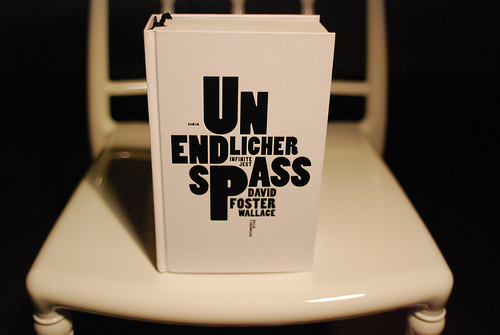
A post re:– neither repost nor riposte–Blake’s wichtige Liste and (only at first) about Infinite Jest in German. Maybe a chair is a good metaphor for who gets translated. Have you been translated? Have the Important Writers on Blake’s list? And not 25 because Saramago, Ouredník, and Zizek are already others, Ben Lerner’s a poet, Aase Berg’s both, and I’ll write about poets in translation and translation in poets at an other time.
Not sure if anyone went there during all the well DFW grammar talk (thanks, Amy), but imagine translating, say, Oblivion. Good that one of Wallace’s German translators, Ulrich Blumenbach, did just that, presumably (it first appeared in 2006), while whittling away at Infinite Jest, which took him six years and has had, as Unendlicher Spass (literally, the less Shakespearean Unending Fun), endless success: ten times the expected five grand copies have been sold since it appeared at the end of August, on the heels of Infinite Summer, which the publisher, KiWi, has translated too, as 100 Days of Infinite Jest (in German–it ended on 12-1).
In an interview with Der Spiegel, Blumenbach (pictured–in German) regrets that the author never answered his many questions, “a list always growing longer”: it seems Wallace had grown weary of taking translator’s queries, and, according to The Complete Review’s useful paraphrase of a slippery summary (still looking for the original source), considered the Spanish La broma infinita (tr. Calvo and Covian | Mondadori, 2002) and the Italian Infinite Jest (Nesi w/ Villoresi and Giua | Einaudi, 2006) and apparently other attempts (anyone know more?) to have “all failed, more or less.”
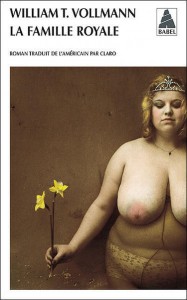 In a warm war, France is responding with (900 pp. of) Vollmann’s Rising (not translated by the great Claro, see below, who did six previous tomes, but by one Jean-Paul Mourlon, translator, it seems, of Jimmy Carter and Hilary Clinton). There’s also German Vollmann (3 titles), Spanish Vollmann (3 more), Japanese Vollmann (2), Greek Vollmann (2), and Czech Vollmann, all (not counting the French) with only one title (Butterfly Stories) repeated.
In a warm war, France is responding with (900 pp. of) Vollmann’s Rising (not translated by the great Claro, see below, who did six previous tomes, but by one Jean-Paul Mourlon, translator, it seems, of Jimmy Carter and Hilary Clinton). There’s also German Vollmann (3 titles), Spanish Vollmann (3 more), Japanese Vollmann (2), Greek Vollmann (2), and Czech Vollmann, all (not counting the French) with only one title (Butterfly Stories) repeated.
American Genius is only a Great American Novel for now (does it even have a British publisher?), despite Tillman’s first book of stories, Tagebuch einer Masochisten, having appeared in Germany in 1986, four years before her first collection in English, READ MORE >



